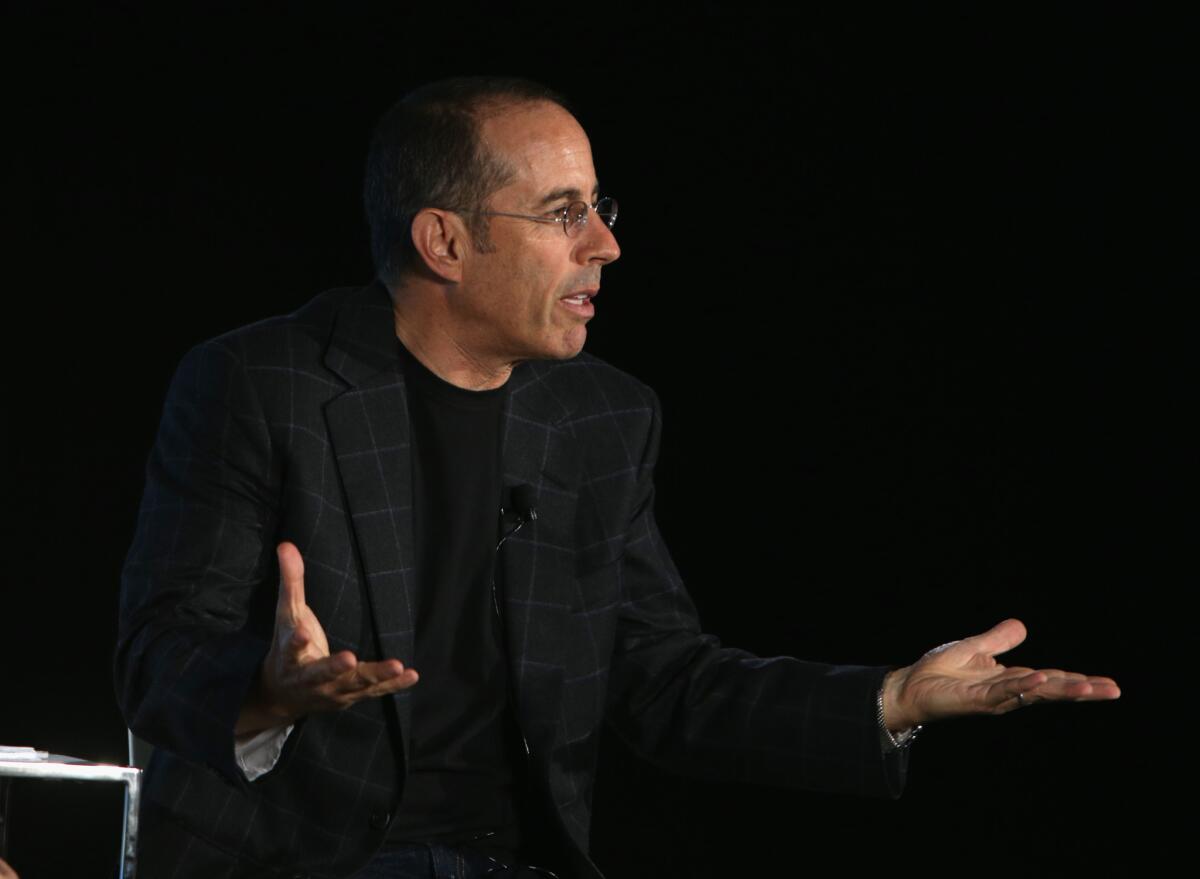Op-Ed: Seinfeld and Maher: More cranky than comic these days

Jerry Seinfeld speaks on stage during Vulture Festival Presents: Coffee with Jerry Seinfeld at Milk Studios, on May 30 in New York City.
- Share via
On his podcast, the comedian Todd Glass recently addressed the argument that the politically correct thought-control police would have destroyed the career of his icon George Carlin. Glass countered that if Carlin were alive today, he would have evolved with the times instead of holding on to the language of the past.
That’s not terribly realistic. If Jerry Seinfeld and Bill Maher’s now-frequent outbursts are any indication, great comedians are no better than anyone else at adapting to shifting mores.
Seinfeld made headlines recently because he said he was no longer willing to play college campuses, which he said felt stifling because modern students are too politically correct. On “Late Night With Seth Meyers” last week, Seinfeld mentioned one joke in particular that doesn’t fly anymore — about how the hand gestures required to manipulate a smartphone make iPhone users look like gay French kings.
“I did this line recently in front of an audience — comedy is where you can kind of feel, like, an opinion — and they thought, ‘What do you mean, gay? What are you talking about gay?’... And I thought, ‘Are you kidding me?’”
Maher has been on a similar tear. On “Real Time With Bill Maher” this month, he referred to Caitlyn Jenner as a “he” and then patted himself on the back for being bold enough to taunt the “pronoun police.”
Both comedians seem to think they are taking stands against oppressive touchiness, but when I watch them rant, I think of old men yelling at kids to get off their front lawns. They see that their jokes don’t get the responses they once did, but instead of blaming themselves, they blame the world.
In an interview with ESPN Radio, Seinfeld talked about his wife telling their 14-year-old daughter that, in the years ahead, she might want to spend more time in the city so she can “see boys.” The daughter responded that her mother’s assumption was sexist.
It’s telling that Seinfeld didn’t ask his daughter why such a comment was sexist but instead decided that she “just wanted” to use words such as “racist,” “sexist” and “prejudice.” Without bothering to explore his daughter’s thinking, Seinfeld decided that kids her age “don’t know what they’re talking about.”
There is no healthy exchange of ideas in the scene Seinfeld described, no debate. The mom is sexist. The daughter and her friends don’t know what they’re talking about. Nothing is learned; nobody’s mind is opened. It’s like an episode of “Seinfeld.” Or maybe an episode of “Leave It to Beaver.” Seinfeld’s lament boils down to: “Kids these days!”
Seinfeld believes his comedy is apolitical. He thinks his observations exist outside the left-right spectrum. And he clearly resents young people trying to impose their own conceptions of prejudice where he feels they do not belong.
Maher, in sharp contrast, sees everything through the lens of politics, but despite basing his career on expressing strong opinions in a debate-style format, he seems increasingly uninterested in other people’s ideas.
On his show over the weekend, he complained, “I used to fight with this audience all the time, because we used to get the audience strictly from liberal sources; then we got the audience like from everywhere and I’ve had a much better time the last couple of months.”
His point, essentially, was that he used to have to deal with an audience that disagreed with him and pushed back; he has solved that supposed problem.
Seinfeld and Maher are perhaps as uncomfortable with modern mainstream sensitivities as with the modern expectation of interaction between an entertainer and the audience. Both men came up in a vastly different comedy environment than the one that exists now, in which the main people they had to answer to were bookers at clubs and television shows (and those bookers were overwhelmingly white, male and heterosexual).
But now everyone with a Twitter or Facebook account has a voice, at least in theory. If a teenager thinks Seinfeld is out of line when he imitates stereotypically gay hand gestures, he can try to rally people to his side.
The comedian Patton Oswalt is a counterexample to Seinfeld and Maher. He has embraced Twitter and social media both as a medium for jokes and opinion but also as a forum for healthy debate. He is an eternal student of culture who has made a point of learning and growing as an artist and a fan.
Comedy increasingly is taking the form of a conversation rather than a one-way expression of ideas and information, and cranky older comedians who opt out of this dialogue risk becoming relics of an earlier era.
Nathan Rabin is a freelance writer, the former head writer of the A.V. Club and the author of four books, most recently “You Don’t Know Me but You Don’t Like Me.”
Follow the Opinion section on Twitter @latimesopinion and Facebook
More to Read
A cure for the common opinion
Get thought-provoking perspectives with our weekly newsletter.
You may occasionally receive promotional content from the Los Angeles Times.









